Education for child workers in Thailand
Child labor is widespread in Thailand, and it’s often young immigrants from Myanmar who are most affected. Many children are forced to drop out of school and work in the physically demanding agriculture and seafood industries. And missing school means they don’t have a chance at getting a good job later on and overcoming poverty. Win Win Wa, 16, was born in Thailand her parents are from Myanmar. After having to work as a child, she was helped into an education by a Thai NGO. Now she’s helping others understand the importance of going to school.
Listen to the report by Nik Martin in Mahachai near Bangkok:
Education for child workers in Thailand
Lesbian activist speaks out in Vietnam
Nguyen Thanh Tam from Saigon is a lesbian. But being gay in Vietnam is not accepted and not easy. She felt so much discrimination and lack of acceptance that she even considered suicide – until she was encouraged by a teacher to come out. She wanted to help others like her avoid the pain and rejection she had felt, so she decided to raise awareness about homosexuality by organizing a gay pride festival, Viet Pride, in Hanoi. It took place last year for the first time. Tam and the other organizers learned a lot from the first event and are working really hard to make Viet Pride 2013 even better.
Listen to the report by Marianne Brown in Hanoi:
Lesbian activist speaks out in Vietnam
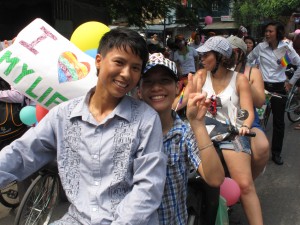
Participants at Viet Pride 2012 rode bicycles so the authorities wouldn’t feel threatened (Photo: Marianne Brown)
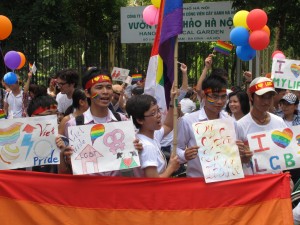
The Vietnamese word for a gay person implies that it is a disease – something campaigners are trying to change (Photo: Marianne Brown)
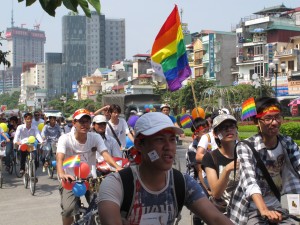
Campaigners are changing their slogan this year to “Right to love is a human right” (Photo: Marianne Brown)
Here’s the Viet Pride website.
Laughter is the best medicine
Anete Baskevica, 22, dresses up as a clown – but not to perform at the circus. Instead she heads to a local children’s hospital where she volunteers her time with kids who are ill. Laughter, she says, is the very best medicine of all. She’s part of a Latvian organization of clowns who have just launched their hospital visits this month (July). They all wear different costumes, but have one very important thing in common: a big red nose.
Listen to Gederts Gelzis report from Riga, Latvia:
Find more pictures on Anete’s blog.
German teen tackles racial stereotypes on YouTube
High school student Sidney Frenz’s mother was German while his father came from Ghana. Tired of being asked about his dark skin color, he’s made a clever YouTube video aimed at promoting tolerance.
Watch the video from DW’s Germany Today.
Cape Town violinist blasts stereotypes
In the townships of Cape Town, playing the violin or the cello has been something for the few people who could afford the expensive instruments and regular lessons. But now one young man, 23-year-old Siyathemba Nteta, is challenging the stereotype that classical music is for rich white people. He teaches children in his township how to play the violin – and even holds lessons in the local language, Xhosa.
Listen to the report by Kim Chakanetsa in Cape Town:
Cape Town violinist blasts stereotypes
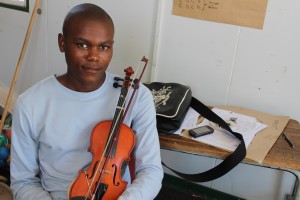
Siyathemba Nteta says people were surprised when he started playing the violin – but that didn’t bother him (Photo: K. Chakanetsa)
Siyathemba plays in the Cape Philharmonic Youth Orchestra. Here’s their Facebook page.
Standing up to everyday sexism
She was sick and tired of rude comments on the bus and inappropriate groping in crowds, so one young Londoner has been sending a clear message to other women: You don’t have to tolerate sexism.
Listen to the report by Joanna Impey in London:
Standing up to everyday sexism
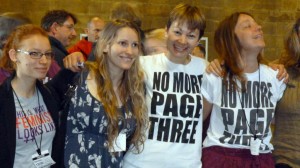
Laura (second from left) has gotten support from British MP Caroline Lucas (second from right) (Photo: J. Impey)
More about the Everyday Sexism Project on their Website.
Follow the Everyday Sexism Project on Twitter.
Working to transform mental health care in Argentina
Valeria reads, writes and paints every Saturday with patients at a mental hospital in Buenos Aires. Not only is she the highlight of their week, she’s also hoping to instigate major reforms to the city’s mental health program.
Listen to the report by Eilis O’Neill in Buenos Aires:
Backed by the Net, Infoladies help rural women
They bike hundreds of miles to bring advice and medicine to thousands in remote, impoverished villages. DW has honored the work of Bangladesh’s “Infoladies” with the 2013 Bobs online activism award.
Mahfuza Akter would have rather gone to university, but her family couldn’t afford the fees. After finishing high school, the country girl had practically no chance of getting a job in her native district of Gaibandha in northern Bangladesh. But luck stroke in 2010 when she managed to get a job as a so-called “Infolady.” For this extraordinary profession, the 25-year-old requires a bicycle, some high-tech devices and plenty of organizational skills.
Read the full article here.
Woman climbs Mount Everest to end poverty
Maria da Conceição became the first Portuguese woman to climb Mount Everest. She did it to raise money so that more Bangladeshis living in poverty would have the chance to find a job and feed their families.
In her job as flight attendant with Emirates Airlines, Maria da Conceição lived in a world of luxury – first class flights and five stars hotels. But that changed eight years ago during a stopover in Dhaka, where she was faced with a different reality.
In Bangladesh, she witnessed impoverished children living on the street, with little access to food and clothes, let alone education.
“I couldn’t ignore the poverty that I saw with my own eyes. It was impossible for me to go back to my daily routine as a flight attendant and ignore what I saw there,” she told DW.
As a result, Maria da Conceição launched the Dhaka Project, helping almost 600 children, by giving them access to education, health care, food, clothes and community aid.
For the former flight attendant, it was “unbelievable” that these children “didn’t have any kind of rights.” Maria said that they were “forgotten” and “ignored” in Dhaka’s streets. “It took a foreigner to come and help them. Now they have some rights,” she said.
The Dhaka Project was a non-profit organization, so Maria had to fight for donations. The majority of funding came from Dubai, in the United Arab Emirates, while there has also been some help from Portugal, Maria’s home country.
The Dhaka Project recognized with the European Union Women Innovators Prize and the Emirates Woman of The Year Award.
Resistance and crisis
Maria criticizes the government of Bangladesh for hindering her work. “I am not welcome in their country. They didn’t give me a visa,” said Maria. And, last year, they even accused her of human trafficking.
“Those were rough times. I fought against that accusation and I said that it wasn’t true and instead of accusing me they should accuse their own country. That put an end to it,” she remembered.
The global economic crisis has also affected the work of The Dhaka Project. Since money was tight, Maria da Conceição decided to restructure the project. Now, it’s known as the Maria Cristina Foundation, named after Maria da Conceição’s foster mother.
“Now, the main focus is on parents. But, whenever a child up to 18 years of age has the opportunity to gain a scholarship, we provide support for the process,” she said.
She also says that she made an agreement with the British Council that enables parents to learn English. That, in turn, makes it possible for them to work in Dubai. Maria helps out with her connections to her last employer, Emirates Airlines. She left that job when a British family decided to take on the costs of the foundation for a two-year period.
“When these people arrive in Dubai they don’t have anything. We help them to buy everything that they need. We take them to the hairdresser, to the dentist and we give them pocket money for food,” she said. “When they start working, the first month goes unpaid, so the foundation helps them to live comfortably during that period of time. Once they receive their first salary, we do what families do when their children have their first job: You have your own salary, so now you don’t need our help anymore.”
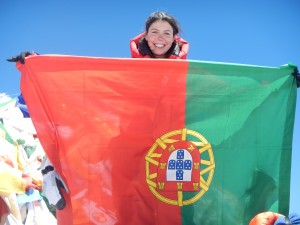
Hardly finished with her first major goal, Maria has already set another (Photo: Maria da Conceição)
Climbing to great heights
Before the global economic crisis, Maria was able to help almost 600 children, but now, because of her tight budget, she can only help one family at a time. Because of that, she was forced to think outside the box. Climbing Mount Everest was a way to get media attention again and raise enough money to continue her work.
She started to prepare for the expedition to Mount Everest a year ago. The training was hard, but she is determined to succeed. “It was a very intense month. I had to go to school in India to learn how to climb a mountain. In Dubai I did conditioning, I did cycling; I had to climb stairs wearing a suit weighing 29 kilograms for at least four hours a day. The training was designed to break me in, physically and mentally,” she said.
And she made it. Maria da Conceição became the first Portuguese woman to climb Mount Everest and now she expects to have the funding she needs to follow up on what she started eight years ago – and help break the chain of poverty in Bangladesh.
But Maria wants to do even more. In November, she will start the 7-7-7 challenge: seven marathons in seven continents in seven days, in order to finance her project. After all, as she told DW, the children and the parents are her family now and her way of life. And after Mount Everest, she’s in great shape.
Go to the Maria Cristina Foundation’s website.
Author: Daniel Pinto Lopes
Editor: Kate Müser
Wheelchair-bound teen singer steals Vietnam’s heart
Brittle bone disease means Phuong Anh is restricted to a wheelchair. “Moving is ordinary; I can do more,” says the 16-year-old singer. A finalist in Vietnam’s Got Talent, she is inspiring other handicapped youth.
Listen to the report by Marianne Brown in Hanoi:



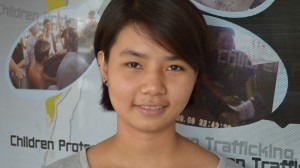

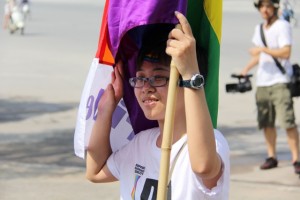
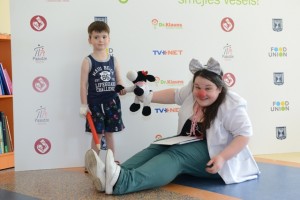
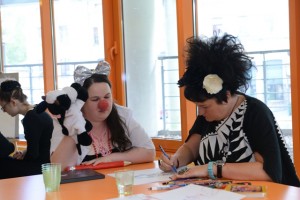
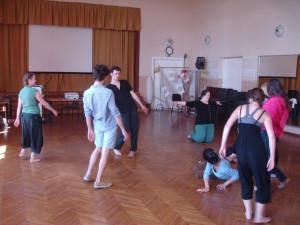

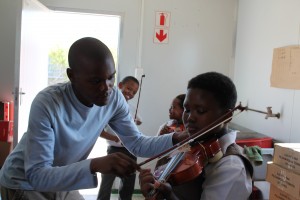
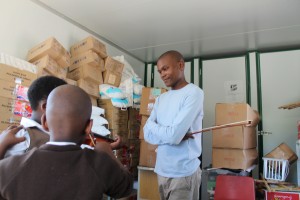
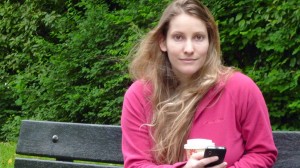
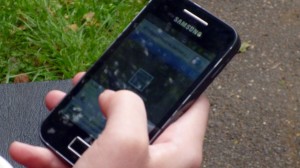


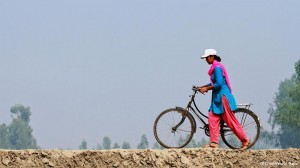
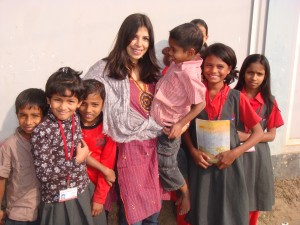
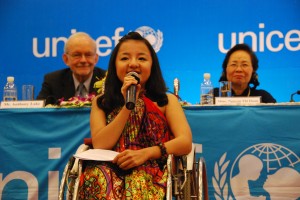
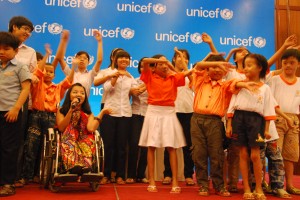
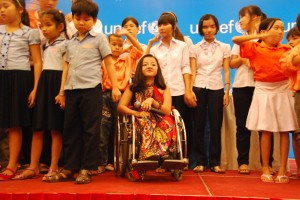




Feedback